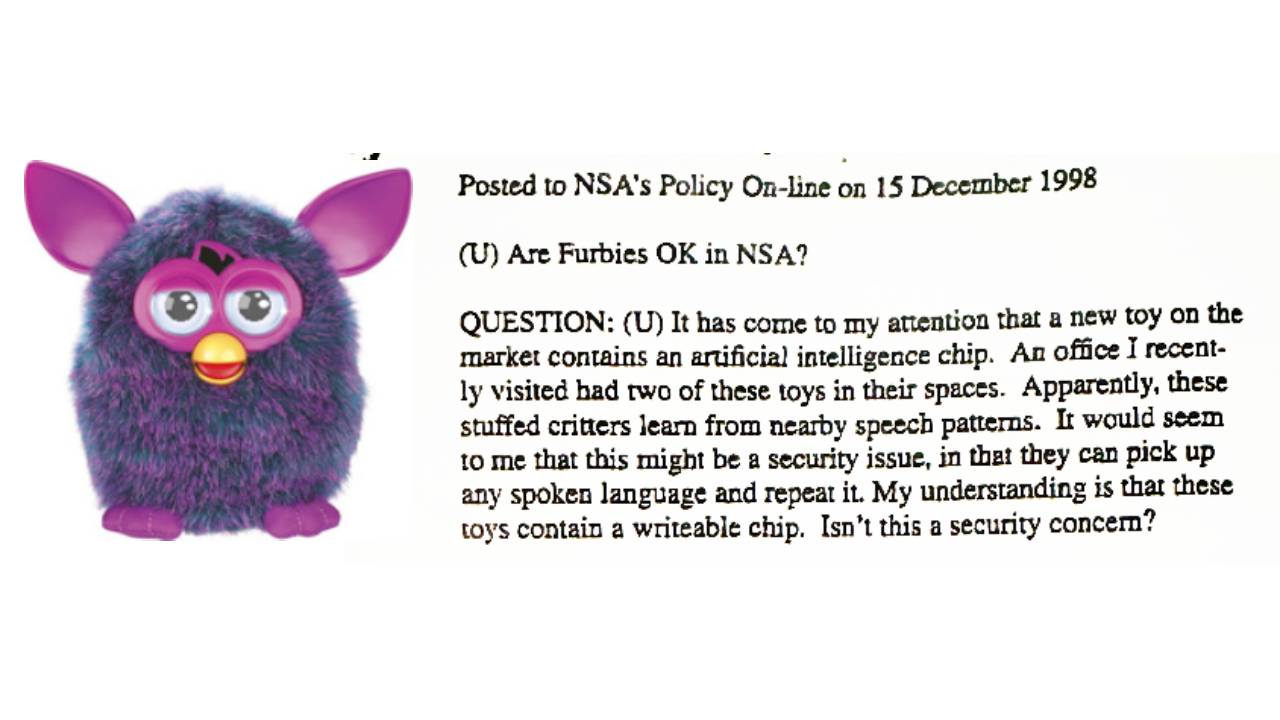NSA spies panicked over 'AI' Furbies way back in the late 90s according to official document dump
An "Artificial Intelligence" chip in a toy. In 1998. Who knew?

Way back in January 1999, the Washington Post got wind of what it declared to be the infamous "Furby Alert". Now official documents proving the story was indeed real have been released. Yes, the NSA really was worried the fuzzy toy that parroted back whatever it heard, which was all the rage back in the late 90s, was powered by an "Artificial Intelligence" chip and represented a security risk. And yes, an official alert was issued.
As reported by 404 media, the official documents were released in response to a somewhat speculative Freedom of Information request by an X user going by the @dakotathecat handle. Apparently, on a bored whim dakotathecat decided to have a punt at requesting the first official confirmation since that late 90s Washington post piece.
The result, reportedly, was a manilla envelope containing 60 pages of documents including employee discussions about the security threat posed by Furbies, an internal memo attempting to manage media coverage following the Washington Post story, and a roll call of all the media outlets that covered the story, many of which you can view here.
The resulting policy memo from the NSA, originally posted in late 1998, includes a query from a worried spook who had spotted a couple of Furbies loitering in an NSA office, prompting a request for official guidance.
"It has come to my attention that a new toy on the market contains an Artificial Intelligence chip," the NSA operative observed. "Apparently these stuffed critters learn from nearby speech patterns. It would seem to me that this might be a security issue, in that they can pick up any spoken language and repeat it," the query continued.
The official response, titled "FURBIE ALERT" is somewhat less conspiratorial, merely noting that "personally owned photographic, video, and audio recording equipment are prohibited items," without explicitly getting on board with the whole "artificial intelligence" thing.

Best CPU for gaming: The top chips from Intel and AMD.
Best gaming motherboard: The right boards.
Best graphics card: Your perfect pixel-pusher awaits.
Best SSD for gaming: Get into the game ahead of the rest.
Some of the NSA operatives engaged in the discussion seemed genuinely concerned. The toy's “I/R port could store signals from any classified wireless systems nearby," one speculated.
The biggest gaming news, reviews and hardware deals
Keep up to date with the most important stories and the best deals, as picked by the PC Gamer team.
But others were more sanguine. "Most speech processing records some audio samples one enough to produce statistics. Does the Furbie flush these buffers? How much information is in a sample? We could launch a study find out, but asking people to leave them at home sounds easier."
So there you have it. A genuine-ish AI security scare at the No Such Agency way back on the late 90s and sparked by a cheap toy. Who'd a thunk it?

Jeremy has been writing about technology and PCs since the 90nm Netburst era (Google it!) and enjoys nothing more than a serious dissertation on the finer points of monitor input lag and overshoot followed by a forensic examination of advanced lithography. Or maybe he just likes machines that go “ping!” He also has a thing for tennis and cars.

